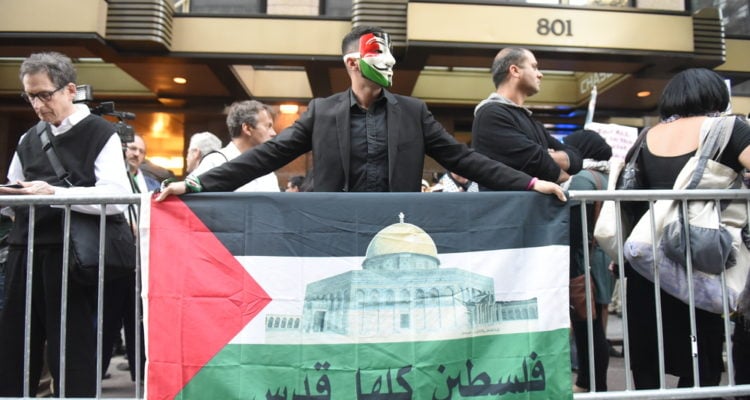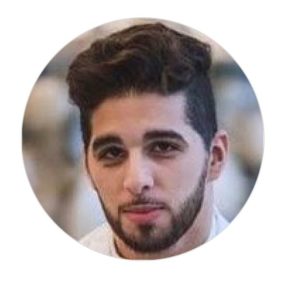I am truly sorry for the pain my words have caused. I have wanted to publicly apologize for, and disavow, my past posts for years now.
By Adam Elayan, JNS
When I was a teenager six to nine years ago, I tweeted horrible anti-Semitic statements. I made generalizations about Jewish people; I promoted stereotypes about Jews; and I blamed Jewish people for bad things in my life.
Since 2017, various groups have been circulating my old tweets, which long ago ceased representing my true thoughts and feelings. One tweet was a photo of a shirt with a picture of Palestinian terrorist Leila Khaled, of whom I didn’t have a good understanding.
I have never supported terrorism, but many people saw my past statements and understandably assumed the worst about me. I was advised by university administrators not to respond to the exposure of my posts, so for years I stayed silent.
I am now publicly turning my back on those statements and sharing my path away from hate and anti-Semitism.
During my childhood, every other summer I went to Jerusalem to visit family. As I grew older and started to realize my family’s difficult circumstances, I started feeling guilty that I was living more comfortably than they. My guilt at my privilege, and my anger at their living conditions, left me looking for someone to blame. As a teenager, I directed my frustration at the Jewish people, posting comments on Twitter that were ugly and hateful.
My views changed as I matured and learned more about the world, including the complex issues in the Middle East. With education and self-reflection, I learned that I was unjustly blaming and demonizing an entire group of people. Throughout college, my experiences helped me realize how misguided my anger at the Jewish community was.
In 2015, three Muslim students were assassinated in North Carolina in an Islamophobic hate crime. Learning about people like me who were murdered because of their religion made me realize how harmful bigotry—like the kind I expressed online—could be.
One victim was Deah Barakat, a dental student organizing a trip to provide dental care to Syrian refugees. His death inspired me to become a dentist. I vowed then that if I reached my goal, I would use my training to provide care to refugees in the Middle East, regardless of their faiths, as Barakat had wanted.
During one trip to Jerusalem, I and my cousin played basketball with some Israeli teenagers whom we met in a park. We talked about our experiences, and the obstacles we each faced because our nations’ leaders have not made peace.
Everyone expressed a desire to live without fear of one another. I recognized that the hatred I voiced online had no place in the life I wanted to lead. I did not want to be consumed by anger and resentment because people like me were suffering; I wanted to take action to alleviate that suffering whenever I saw it. I removed all my tweets from my profile, because I no longer supported the hateful things that I had said in the past.
A year later, my past anti-Semitic statements were collected and published online. By that time, it felt like I was reading someone else’s words. It filled me with disgust to be associated with words that I saw to be hateful and wrong. I spoke with my college, and was advised not to respond to the publication. When these tweets were brought to my dental school’s attention in 2019 and 2020, I was again advised not to respond, and again I followed that advice.
I am truly sorry for the pain my words have caused. I have wanted to publicly apologize for, and disavow, my teenage tweets for years now. Perhaps I should have taken this step earlier, against the advice I received.
I recognize that the things I said years ago were hateful, and for the last six years, I have been committed to making a positive impact in my community and showing that those tweets do not represent who I am. I am someone who had misguided beliefs, who through education and self-reflection has come to recognize that those beliefs were wrong, and who is trying to lead a life that will help others.
Recently, I spoke with Hussein Aboubakr, author of Minority of One: The Unchaining of an Arab Mind, and an educator with StandWithUs. In that autobiography, he discusses how education transformed him from an anti-Semitic extremist in his youth to a vocal advocate for acceptance of Israel and the Jewish people.
His story helped me understand my situation in a broader context, where the kind of rhetoric I used against Jewish people is prevalent within Arab communities, something those of us in these communities are responsible for addressing. I recognized Mr. Aboubakr’s internal struggle of learning to reject what he was taught, think critically about the hatred he once espoused and come to terms with ugly truths about who he had been.
One portion of his story truly resonated with me. After participating in a protest in Cairo, Mr. Aboubakr sought refuge in an orphanage. Seeing the distraught Mr. Aboubakr, the orphanage director told him, “Don’t live for anger, but live for love.”
That advice put into words what I felt when I realized that I no longer believed the hateful things I had once written, and instead decided to focus on improving the lives of those around me. While I still feel anger and sadness at the hardships that my community faces, I no longer live for that anger. I choose, instead, to live for the love I have for my family and my community, and to be someone who supports the people around me.
I cannot take back the horrible things that I tweeted. What I can do is make clear that they do not represent who I am today.
I can listen to, and learn from, people I harmed with those tweets. I can continue to treat all people respectfully. And I can hope that someone reading my story, who may harbor the kind of prejudice that I used to, will see that hatred towards others is a choice we make, and like me, decide to make better choices.
Adam Elayan is a dental student at Tufts University.






